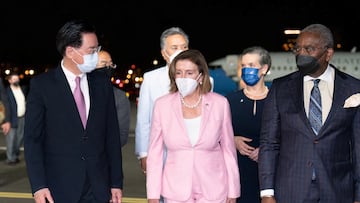Nancy Pelosi visits Taiwan: how will this affect the United States’ ‘One China’ policy?
The controversial diplomatic trip has been criticised by Beijing, who believe the Taipei visit undermines their ambitions in the region.


Speaker of the House Nancy Pelosi arrived in Taiwan on Tuesday to begin a controversial visit that could draw the United States into a confrontation with China.
The high-profile diplomatic trip immediately drew a swift response from the Chinese government and has sparked a degree of military posturing already. Pelosi is the highest-ranking American politician to visit the island of Taiwan for 25 years, something that she claimed is a signal of the US’ “unwavering commitment” to the island’s nascent democracy.
Speaking to reporters in the capital city of Taipei, Pelosi said: “America’s solidarity with the 23 million people of Taiwan is more important today than ever, as the world faces a choice between autocracy and democracy.”
Nancy Pelosi became the highest-ranking American politician to visit Taiwan in 25 years, prompting China to announce missile tests and military drills encircling the island https://t.co/IwRdt6ufHP pic.twitter.com/maUEipb3Sc
— Bloomberg (@business) August 2, 2022
However that viewpoint was challenged by the ruling Chinese Communist Party, who released a statement claiming that the visit “seriously undermines the political foundation of Sino-US relations,” and threatens China’s sovereignty.
So how can the two global powers have such different impressions of Pelosi’s visit? And what does the often-mentioned ‘One China’ policy have to do with it?
What is the United States’ One China policy?
The split between China and Taiwan begins in 1949 with the aftermath of the Chinese civil war. The defeated Nationalists retreated to Taiwan and declared their own government there, claiming to represent all of China.
For decades the US and other western nations opted to recognise the Taiwan-based government over the capital of Communist China in Beijing. However by the 1970s the US realised that restoring relations with China, which was becoming increasingly prosperous, would be an important diplomatic objective.
To engage in diplomatic relations with China, countries must also break off relations with Taiwan, which the mainland Chinese government sees as a breakaway region which will one day be reunified.
As such, the US’s ‘One China’ policy essentially states that they only recognise a single Chinese government; the one in Beijing. This has become a cornerstone in US-Sino relations and one which has formed the basis of cooperation on many diplomatic issues. However it does not prevent American involvement in Taiwan and the US State Department describes having a “robust unofficial relationship” with the region.
This is in contrast to China’s own One China principle, which holds that Taiwan is intrinsically a part of China and can one day be reunited. The Beijing government recognises only a single Chinese nation, of which Taiwan is a part.
Related stories
While the US explicitly does not support Taiwanese independence, it also claims the right to provide “defense articles and services as necessary to enable Taiwan to maintain a sufficient self-defense capability.”
This subtle difference between the two powers’ interpretation of ‘One China’ is at the centre of the controversy surrounding Pelosi’s trip. The US considers it a visit to a diplomatic ally, while Beijing is concerned that it undermines the Chinese Communist Party’s own One China vision.

